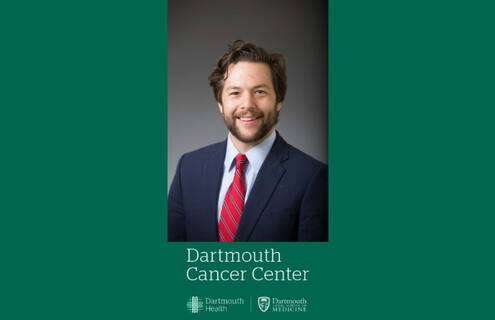
The treatment for prostate cancer depends on the stage of the disease, the patient’s overall health, and personal preferences.
Lawrence W. Dagrosa, MDThe office of President Joe Biden announced Sunday afternoon that Biden, 82, was diagnosed on Friday with prostate cancer that had metastasized in his skeleton. While the aggressive form of cancer the former president was diagnosed with is rare, prostate cancer overall is not: according to the American Cancer Society, about 1 in 8 men will be diagnosed with prostate cancer during their lifetime. Other than skin cancer, prostate cancer, which can range from slow-growing to aggressive, is the most common cancer in men in the United States, and the second-leading cause of cancer death in American men, behind lung cancer.
“The treatment for prostate cancer depends on the stage of the disease, the patient’s overall health, and personal preferences,” said Lawrence M. Dagrosa, MD, a urologist who treats prostate cancer patients at Dartmouth Cancer Center. “Common treatment options may include active surveillance for early-stage or slow-growing prostate cancer, surgery (prostatectomy), radiation therapy, hormone therapy, chemotherapy or immunotherapy.”
Many men know that they should start screening for prostate cancer as they get older, but other factors besides age play a role in a man’s individual risk factor. “Symptoms of prostate cancer generally only appear in later stages,” Dagrosa said. “Men over the age of 50 are at higher risk, and African-American men tend to have a higher incidence. A family history of prostate cancer, as well as certain genetic mutations, are also linked to an elevated risk.”
Besides being aware of these risk factors and screening accordingly, most prostate cancer patients show no symptoms of disease. Unlike testicular or breast cancer, there is no telltale lump that the patient can sometimes feel. Some men may have trouble urinating, but this is common in men as they age and is more likely related to a non-cancerous condition.
“Unfortunately, this means that without screening, there is almost no way to detect these cancers early when they are the most treatable,” Dagrosa said. “Symptoms such as pain in the hips, back or pelvis from metastatic prostate cancer, like the kind President Biden was recently found to have, are only seen in the later stages of the disease.”
Today, May 20, is international Clinical Trials Day. Dartmouth Cancer Center is currently running six trials for the treatment of prostate cancer at sites in New Hampshire and Vermont. Learn more about prostate cancer by visiting the webpage for Dartmouth Cancer Center’s Genitourinary Oncology Program.
About Dartmouth Cancer Center
Dartmouth Cancer Center combines advanced cancer research at Dartmouth and the Geisel School of Medicine, with award-winning, personalized, and compassionate patient-centered cancer care and clinical trials based at the Norris Cotton Cancer Care Pavilion at Dartmouth Health's Dartmouth Hitchcock Medical Center. With 14 locations around New Hampshire and Vermont, Dartmouth Cancer Center is one of only 57 National Cancer Institute-designated Comprehensive Cancer Centers. Each year the Dartmouth Cancer Center schedules 74,000 appointments seeing more than 4,500 newly diagnosed patients, and currently offers patients more than 240 active clinical trials. Celebrating its 50th anniversary in 2022, Dartmouth Cancer Center remains committed to excellence, outreach and education. We strive to prevent and cure cancer, enhance survivorship and to promote cancer health equity through pioneering interdisciplinary research and collaborations. Learn more at the Dartmouth Cancer Center website.
About Dartmouth Health
Dartmouth Health, New Hampshire’s only academic health system and the state’s largest private employer, serves patients across northern New England. Dartmouth Health provides access to more than 2,000 providers in almost every area of medicine, delivering care at its flagship hospital, Dartmouth Hitchcock Medical Center (DHMC) in Lebanon, NH, as well as across its wide network of hospitals, clinics and care facilities. DHMC is consistently named the #1 hospital in New Hampshire by U.S. News & World Report, and is recognized for high performance in numerous clinical specialties and procedures. Dartmouth Health includes Dartmouth Cancer Center, one of only 57 National Cancer Institute-designated Comprehensive Cancer Centers in the nation, and the only such center in northern New England; Dartmouth Health Children’s, which includes the state’s only children’s hospital and multiple locations around the region; member hospitals in Lebanon, Keene, Claremont and New London, NH, and Windsor and Bennington, VT; Visiting Nurse and Hospice for Vermont and New Hampshire; and more than 24 clinics that provide ambulatory and specialty services across New Hampshire and Vermont. Through its historical partnership with Dartmouth and the Geisel School of Medicine, Dartmouth Health trains nearly 400 medical residents and fellows annually, and performs cutting-edge research and clinical trials recognized across the globe with Geisel and the White River Junction VA Medical Center in White River Junction, VT. Dartmouth Health and its more than 13,000 employees are deeply committed to serving the healthcare needs of everyone in our communities, and to providing each of our patients with exceptional, personal care.